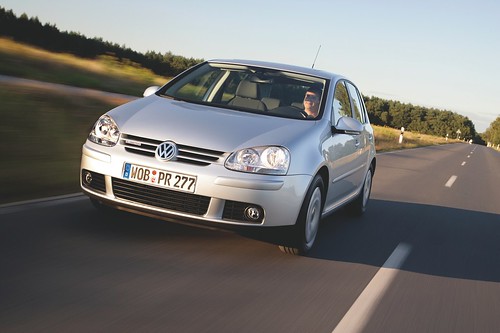I continue to be a bit perplexed when it comes to the anti-VW campaign Greenpeace is mounting (latest here), for a number of reasons.
Greenpeace is upset because…
- VW advertises its eco-line, Bluemotion, heavily but…
- Only sells about 6% of their cars under this badge…
- And charges an ‘unfair’ premium for them
- VW is lobbying against EU regulation to enforce CO2 emissions caps
Now… my view is this this is poorly thought through on counts 1-3. Here’s why.
- Most people think of eco-cars as under performing, slow, unexciting, and generally less fun than their full-powered alternatives. If you don’t think this is true, have a read of some of the comments on Greenpeace’s own blog! People believe them to be "unsafe" because they believe them to be underpowered. This is not true, I can say with the voice of experience, as our 107g/km Bluemotion Golf is zippy in the extreme despite its 1.6l TDI engine, but it’s not VW’s fault that people don’t know / believe that. That’s now how they advertise their cars, oddly enough.
- Because people believe them to be slow and underpowered, they don’t want to buy them. If you’re spending £20kish on a new car, are you going to pick the fun one or the not-so-fun-one, even if it is marginally cheaper to run? I know which one I’d pick, but I would never buy a new car as I have a good understanding of the economics of depreciation. So the heavy advertising of Bluemotion must be helping change people’s minds, or at a least addressing the fundamental issue that people don’t think they want this sort of car, on the whole. Good on them for investing in a market only 6% of their customers currently want.
- When I looked into it (when buying our second hand Golf) to get a sense of prices, the premium on a new Bluemotion car that was otherwise pretty much like-for-like identical to the standard car was about £800. On a £22,000 car. Which amounts to about 4%. When I did the maths, for any decent mileage you drove, that premium was paid for within three years (between road tax discounts and improved mileage), and sooner if you live in an area where you get parking or congestion charge discount for driving a low-emissions vehicle, or drove more. So I’d hardly call that an ‘unfair’ premium. It’s true, second hand they command a much heftier premium, but again, that’s a supply/demand issue; most people aren’t buying the car new so there’s lower stock of them second hand. And therefore trying to buy one second hand is more expensive (for those of us that recognise the value of the low-emissions cars). Again, not VW’s fault.
- I’m in two minds about the lobbying issue. Whilst I do think that heavier regulation can shift consumer demand, it has implications for the free market model and consumer choice. I tend to think prohibitive National taxation is a more effective tool than EU legislation in this sort of context. After all, in the current economic environment, it would be very, very hard indeed for the automotive lobby to successfully push back a policy which upped tax disc costs by 30% for (new) cars with emissions over 200g/km or 20% for cars over 150g/km (or something like that). Or even more dramatic charges; it reminds me of the episode of Yes Prime Minister where the tobacco and anti-tobacco lobby were both trying to get Jim Hacker to support their cause; the anti-tobacco lobby were suggesting raising taxes on cigarettes to the point where a pack of 20 cost as much as a bottle of whiskey… could be an effective policy for deterring all but the most hardcore of smokers, and the same holds true for people’s choice in a new car!
Finally, for an organisation that’s campaigned against cloud computing, advocating the use of social media for protest as they are here basically adds to the burden of the data centres hosting their George-Lucas-ripping-off content, so they’re actually hurting the environment by their own logic (that’s another poor argument, but I’ll leave it for now)…


